Unit 12: Organisational Behaviour
VerifiedAdded on 2023/01/13
|16
|4970
|24
AI Summary
Contribute Materials
Your contribution can guide someone’s learning journey. Share your
documents today.
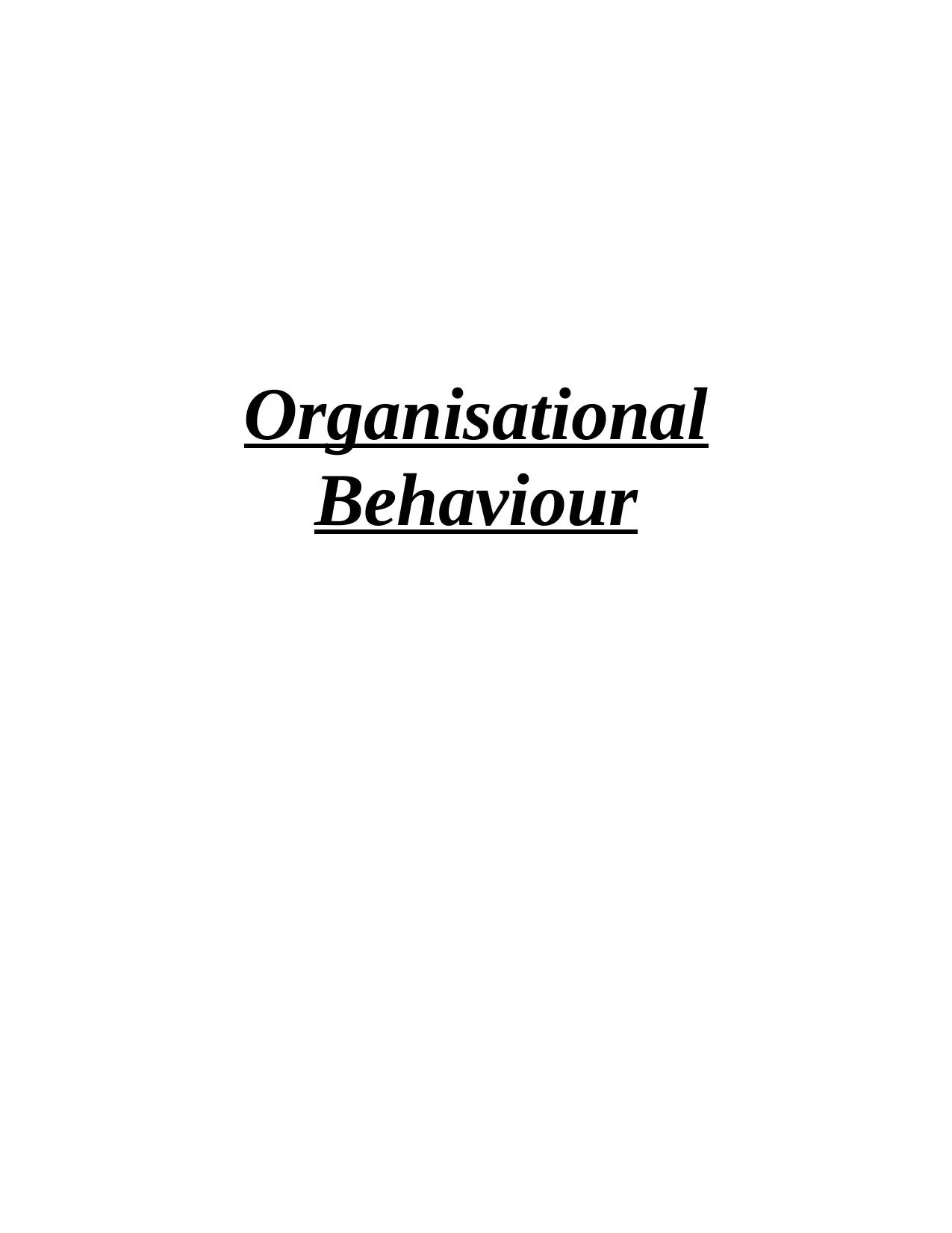
Organisational
Behaviour
Behaviour
Secure Best Marks with AI Grader
Need help grading? Try our AI Grader for instant feedback on your assignments.
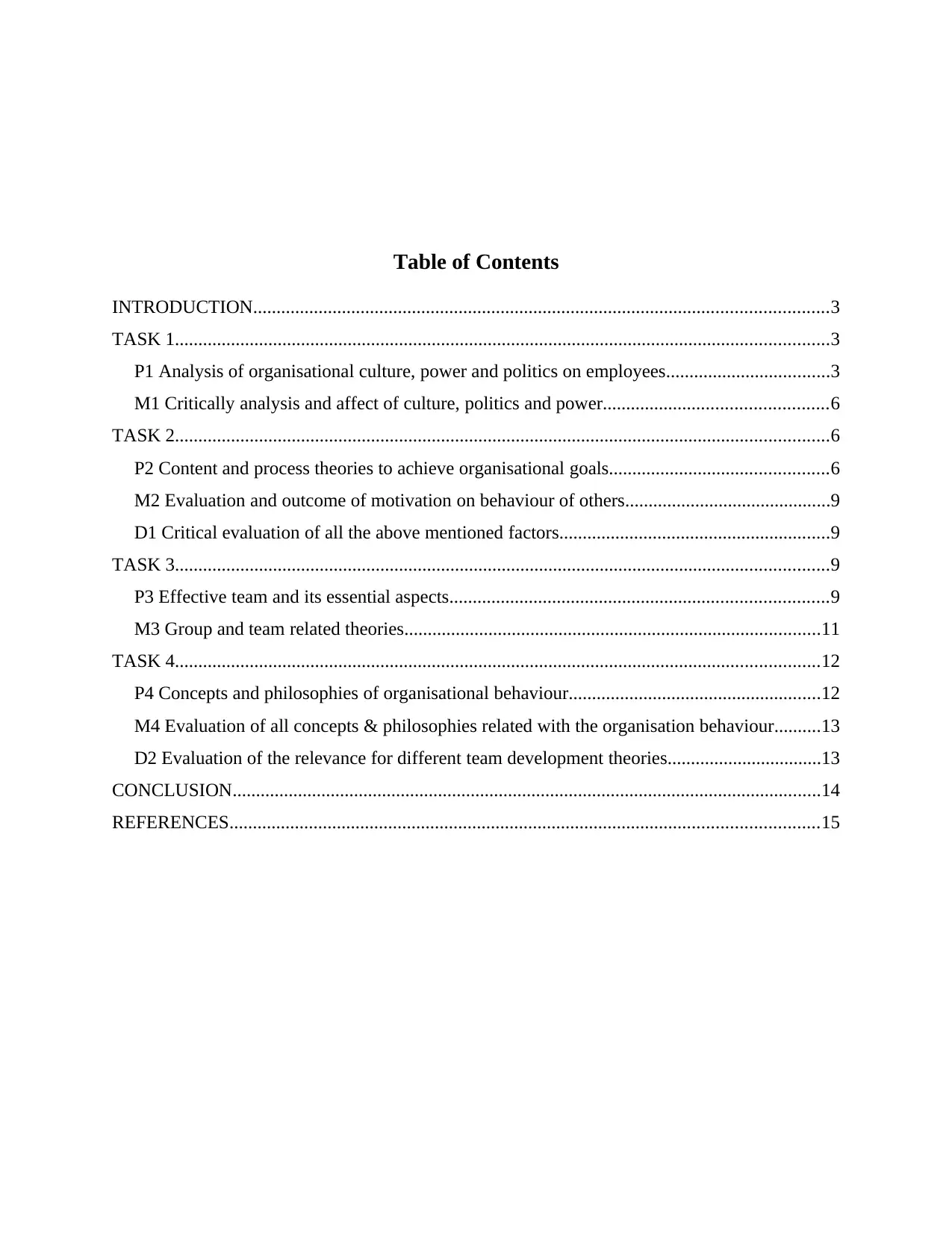
Table of Contents
INTRODUCTION...........................................................................................................................3
TASK 1............................................................................................................................................3
P1 Analysis of organisational culture, power and politics on employees...................................3
M1 Critically analysis and affect of culture, politics and power................................................6
TASK 2............................................................................................................................................6
P2 Content and process theories to achieve organisational goals...............................................6
M2 Evaluation and outcome of motivation on behaviour of others............................................9
D1 Critical evaluation of all the above mentioned factors..........................................................9
TASK 3............................................................................................................................................9
P3 Effective team and its essential aspects.................................................................................9
M3 Group and team related theories.........................................................................................11
TASK 4..........................................................................................................................................12
P4 Concepts and philosophies of organisational behaviour......................................................12
M4 Evaluation of all concepts & philosophies related with the organisation behaviour..........13
D2 Evaluation of the relevance for different team development theories.................................13
CONCLUSION..............................................................................................................................14
REFERENCES..............................................................................................................................15
INTRODUCTION...........................................................................................................................3
TASK 1............................................................................................................................................3
P1 Analysis of organisational culture, power and politics on employees...................................3
M1 Critically analysis and affect of culture, politics and power................................................6
TASK 2............................................................................................................................................6
P2 Content and process theories to achieve organisational goals...............................................6
M2 Evaluation and outcome of motivation on behaviour of others............................................9
D1 Critical evaluation of all the above mentioned factors..........................................................9
TASK 3............................................................................................................................................9
P3 Effective team and its essential aspects.................................................................................9
M3 Group and team related theories.........................................................................................11
TASK 4..........................................................................................................................................12
P4 Concepts and philosophies of organisational behaviour......................................................12
M4 Evaluation of all concepts & philosophies related with the organisation behaviour..........13
D2 Evaluation of the relevance for different team development theories.................................13
CONCLUSION..............................................................................................................................14
REFERENCES..............................................................................................................................15
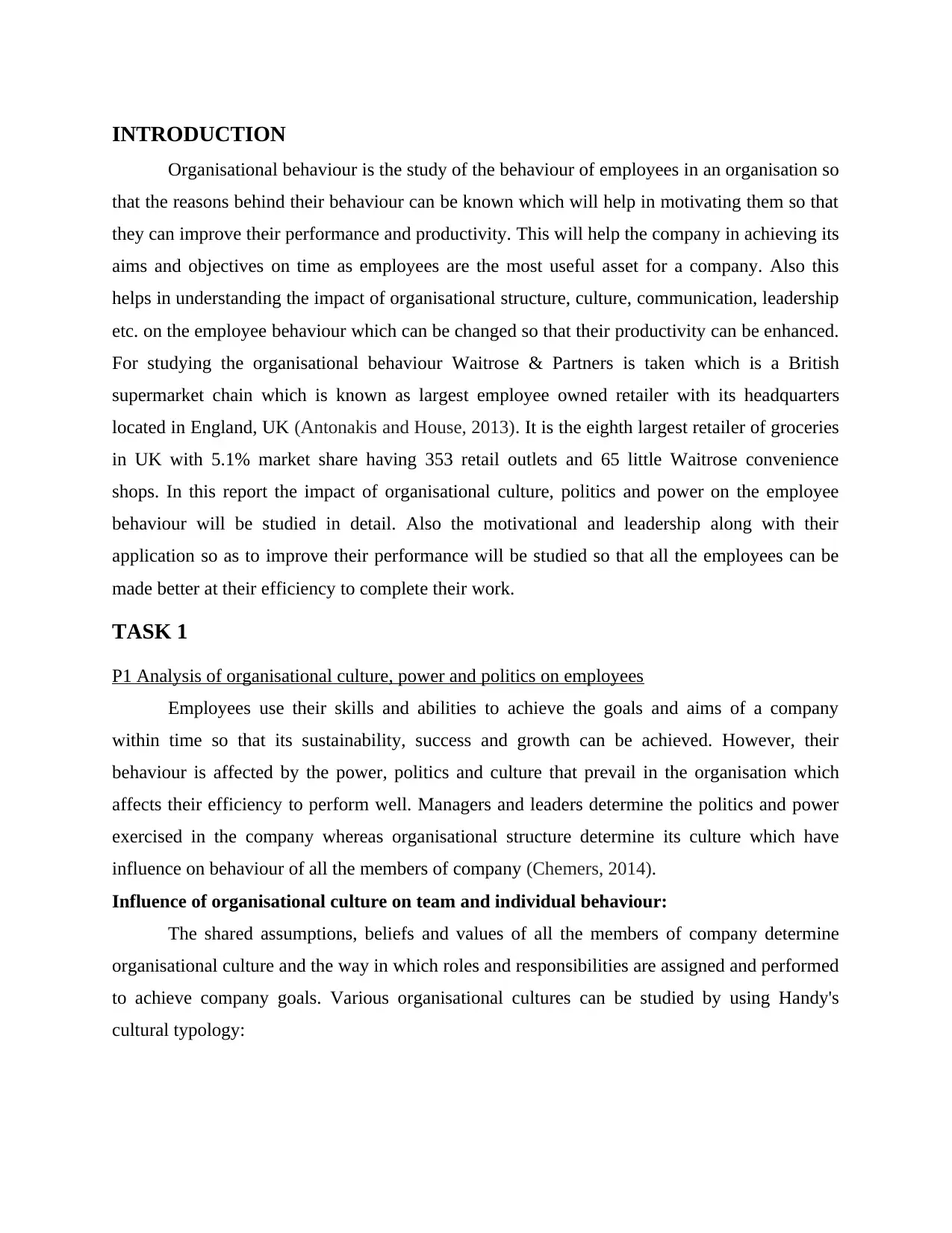
INTRODUCTION
Organisational behaviour is the study of the behaviour of employees in an organisation so
that the reasons behind their behaviour can be known which will help in motivating them so that
they can improve their performance and productivity. This will help the company in achieving its
aims and objectives on time as employees are the most useful asset for a company. Also this
helps in understanding the impact of organisational structure, culture, communication, leadership
etc. on the employee behaviour which can be changed so that their productivity can be enhanced.
For studying the organisational behaviour Waitrose & Partners is taken which is a British
supermarket chain which is known as largest employee owned retailer with its headquarters
located in England, UK (Antonakis and House, 2013). It is the eighth largest retailer of groceries
in UK with 5.1% market share having 353 retail outlets and 65 little Waitrose convenience
shops. In this report the impact of organisational culture, politics and power on the employee
behaviour will be studied in detail. Also the motivational and leadership along with their
application so as to improve their performance will be studied so that all the employees can be
made better at their efficiency to complete their work.
TASK 1
P1 Analysis of organisational culture, power and politics on employees
Employees use their skills and abilities to achieve the goals and aims of a company
within time so that its sustainability, success and growth can be achieved. However, their
behaviour is affected by the power, politics and culture that prevail in the organisation which
affects their efficiency to perform well. Managers and leaders determine the politics and power
exercised in the company whereas organisational structure determine its culture which have
influence on behaviour of all the members of company (Chemers, 2014).
Influence of organisational culture on team and individual behaviour:
The shared assumptions, beliefs and values of all the members of company determine
organisational culture and the way in which roles and responsibilities are assigned and performed
to achieve company goals. Various organisational cultures can be studied by using Handy's
cultural typology:
Organisational behaviour is the study of the behaviour of employees in an organisation so
that the reasons behind their behaviour can be known which will help in motivating them so that
they can improve their performance and productivity. This will help the company in achieving its
aims and objectives on time as employees are the most useful asset for a company. Also this
helps in understanding the impact of organisational structure, culture, communication, leadership
etc. on the employee behaviour which can be changed so that their productivity can be enhanced.
For studying the organisational behaviour Waitrose & Partners is taken which is a British
supermarket chain which is known as largest employee owned retailer with its headquarters
located in England, UK (Antonakis and House, 2013). It is the eighth largest retailer of groceries
in UK with 5.1% market share having 353 retail outlets and 65 little Waitrose convenience
shops. In this report the impact of organisational culture, politics and power on the employee
behaviour will be studied in detail. Also the motivational and leadership along with their
application so as to improve their performance will be studied so that all the employees can be
made better at their efficiency to complete their work.
TASK 1
P1 Analysis of organisational culture, power and politics on employees
Employees use their skills and abilities to achieve the goals and aims of a company
within time so that its sustainability, success and growth can be achieved. However, their
behaviour is affected by the power, politics and culture that prevail in the organisation which
affects their efficiency to perform well. Managers and leaders determine the politics and power
exercised in the company whereas organisational structure determine its culture which have
influence on behaviour of all the members of company (Chemers, 2014).
Influence of organisational culture on team and individual behaviour:
The shared assumptions, beliefs and values of all the members of company determine
organisational culture and the way in which roles and responsibilities are assigned and performed
to achieve company goals. Various organisational cultures can be studied by using Handy's
cultural typology:
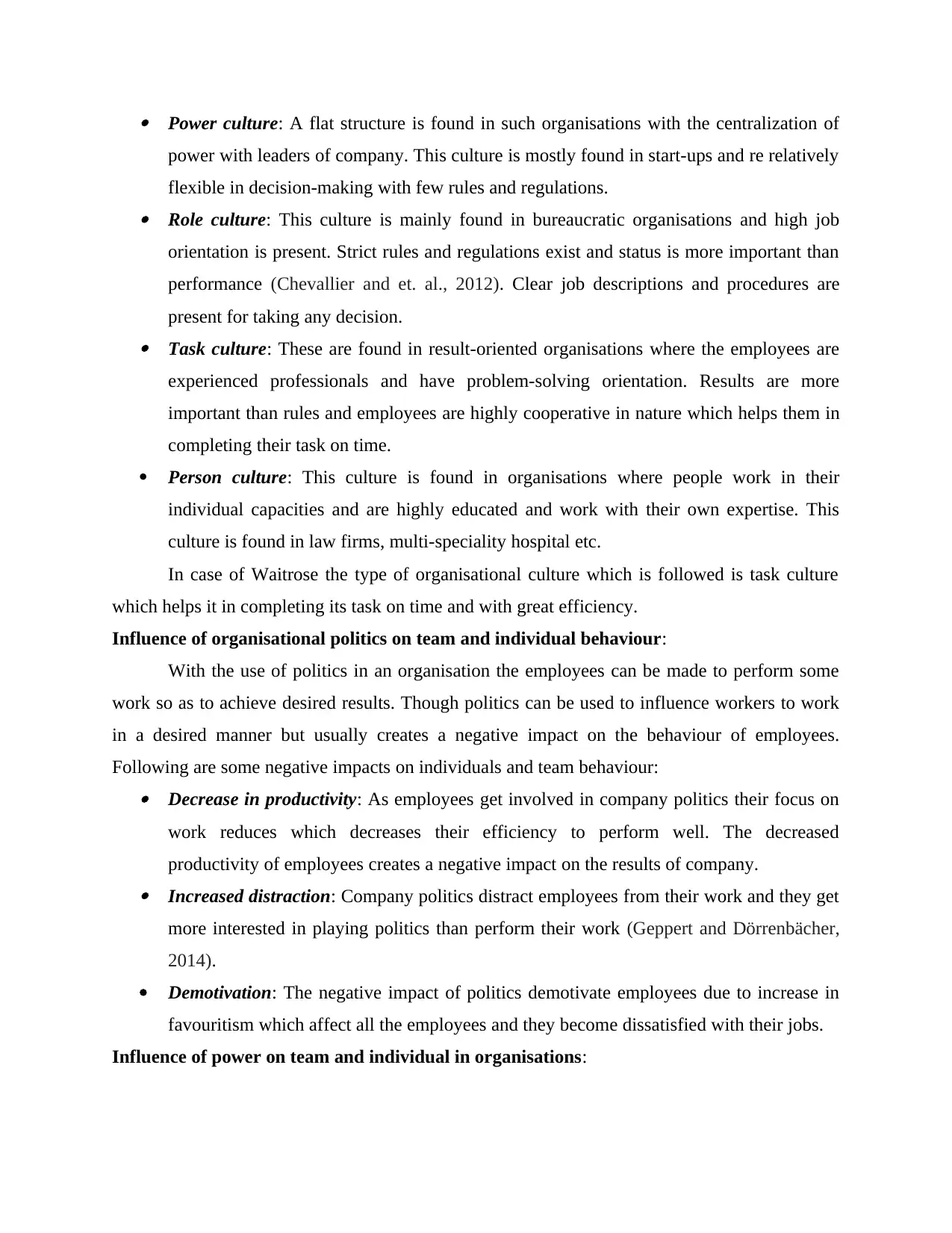
Power culture: A flat structure is found in such organisations with the centralization of
power with leaders of company. This culture is mostly found in start-ups and re relatively
flexible in decision-making with few rules and regulations. Role culture: This culture is mainly found in bureaucratic organisations and high job
orientation is present. Strict rules and regulations exist and status is more important than
performance (Chevallier and et. al., 2012). Clear job descriptions and procedures are
present for taking any decision. Task culture: These are found in result-oriented organisations where the employees are
experienced professionals and have problem-solving orientation. Results are more
important than rules and employees are highly cooperative in nature which helps them in
completing their task on time.
Person culture: This culture is found in organisations where people work in their
individual capacities and are highly educated and work with their own expertise. This
culture is found in law firms, multi-speciality hospital etc.
In case of Waitrose the type of organisational culture which is followed is task culture
which helps it in completing its task on time and with great efficiency.
Influence of organisational politics on team and individual behaviour:
With the use of politics in an organisation the employees can be made to perform some
work so as to achieve desired results. Though politics can be used to influence workers to work
in a desired manner but usually creates a negative impact on the behaviour of employees.
Following are some negative impacts on individuals and team behaviour: Decrease in productivity: As employees get involved in company politics their focus on
work reduces which decreases their efficiency to perform well. The decreased
productivity of employees creates a negative impact on the results of company. Increased distraction: Company politics distract employees from their work and they get
more interested in playing politics than perform their work (Geppert and Dörrenbächer,
2014).
Demotivation: The negative impact of politics demotivate employees due to increase in
favouritism which affect all the employees and they become dissatisfied with their jobs.
Influence of power on team and individual in organisations:
power with leaders of company. This culture is mostly found in start-ups and re relatively
flexible in decision-making with few rules and regulations. Role culture: This culture is mainly found in bureaucratic organisations and high job
orientation is present. Strict rules and regulations exist and status is more important than
performance (Chevallier and et. al., 2012). Clear job descriptions and procedures are
present for taking any decision. Task culture: These are found in result-oriented organisations where the employees are
experienced professionals and have problem-solving orientation. Results are more
important than rules and employees are highly cooperative in nature which helps them in
completing their task on time.
Person culture: This culture is found in organisations where people work in their
individual capacities and are highly educated and work with their own expertise. This
culture is found in law firms, multi-speciality hospital etc.
In case of Waitrose the type of organisational culture which is followed is task culture
which helps it in completing its task on time and with great efficiency.
Influence of organisational politics on team and individual behaviour:
With the use of politics in an organisation the employees can be made to perform some
work so as to achieve desired results. Though politics can be used to influence workers to work
in a desired manner but usually creates a negative impact on the behaviour of employees.
Following are some negative impacts on individuals and team behaviour: Decrease in productivity: As employees get involved in company politics their focus on
work reduces which decreases their efficiency to perform well. The decreased
productivity of employees creates a negative impact on the results of company. Increased distraction: Company politics distract employees from their work and they get
more interested in playing politics than perform their work (Geppert and Dörrenbächer,
2014).
Demotivation: The negative impact of politics demotivate employees due to increase in
favouritism which affect all the employees and they become dissatisfied with their jobs.
Influence of power on team and individual in organisations:
Paraphrase This Document
Need a fresh take? Get an instant paraphrase of this document with our AI Paraphraser
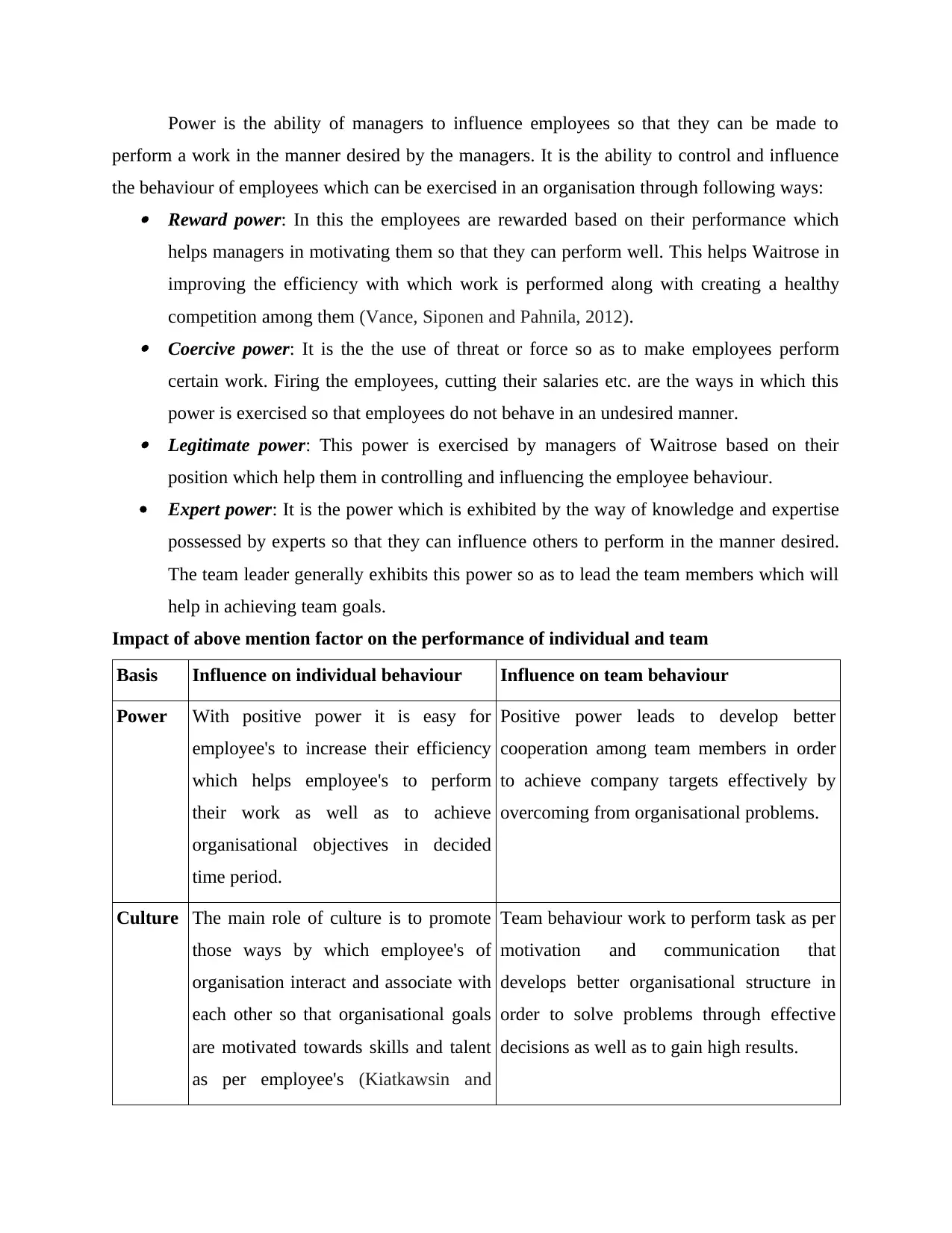
Power is the ability of managers to influence employees so that they can be made to
perform a work in the manner desired by the managers. It is the ability to control and influence
the behaviour of employees which can be exercised in an organisation through following ways: Reward power: In this the employees are rewarded based on their performance which
helps managers in motivating them so that they can perform well. This helps Waitrose in
improving the efficiency with which work is performed along with creating a healthy
competition among them (Vance, Siponen and Pahnila, 2012). Coercive power: It is the the use of threat or force so as to make employees perform
certain work. Firing the employees, cutting their salaries etc. are the ways in which this
power is exercised so that employees do not behave in an undesired manner. Legitimate power: This power is exercised by managers of Waitrose based on their
position which help them in controlling and influencing the employee behaviour.
Expert power: It is the power which is exhibited by the way of knowledge and expertise
possessed by experts so that they can influence others to perform in the manner desired.
The team leader generally exhibits this power so as to lead the team members which will
help in achieving team goals.
Impact of above mention factor on the performance of individual and team
Basis Influence on individual behaviour Influence on team behaviour
Power With positive power it is easy for
employee's to increase their efficiency
which helps employee's to perform
their work as well as to achieve
organisational objectives in decided
time period.
Positive power leads to develop better
cooperation among team members in order
to achieve company targets effectively by
overcoming from organisational problems.
Culture The main role of culture is to promote
those ways by which employee's of
organisation interact and associate with
each other so that organisational goals
are motivated towards skills and talent
as per employee's (Kiatkawsin and
Team behaviour work to perform task as per
motivation and communication that
develops better organisational structure in
order to solve problems through effective
decisions as well as to gain high results.
perform a work in the manner desired by the managers. It is the ability to control and influence
the behaviour of employees which can be exercised in an organisation through following ways: Reward power: In this the employees are rewarded based on their performance which
helps managers in motivating them so that they can perform well. This helps Waitrose in
improving the efficiency with which work is performed along with creating a healthy
competition among them (Vance, Siponen and Pahnila, 2012). Coercive power: It is the the use of threat or force so as to make employees perform
certain work. Firing the employees, cutting their salaries etc. are the ways in which this
power is exercised so that employees do not behave in an undesired manner. Legitimate power: This power is exercised by managers of Waitrose based on their
position which help them in controlling and influencing the employee behaviour.
Expert power: It is the power which is exhibited by the way of knowledge and expertise
possessed by experts so that they can influence others to perform in the manner desired.
The team leader generally exhibits this power so as to lead the team members which will
help in achieving team goals.
Impact of above mention factor on the performance of individual and team
Basis Influence on individual behaviour Influence on team behaviour
Power With positive power it is easy for
employee's to increase their efficiency
which helps employee's to perform
their work as well as to achieve
organisational objectives in decided
time period.
Positive power leads to develop better
cooperation among team members in order
to achieve company targets effectively by
overcoming from organisational problems.
Culture The main role of culture is to promote
those ways by which employee's of
organisation interact and associate with
each other so that organisational goals
are motivated towards skills and talent
as per employee's (Kiatkawsin and
Team behaviour work to perform task as per
motivation and communication that
develops better organisational structure in
order to solve problems through effective
decisions as well as to gain high results.
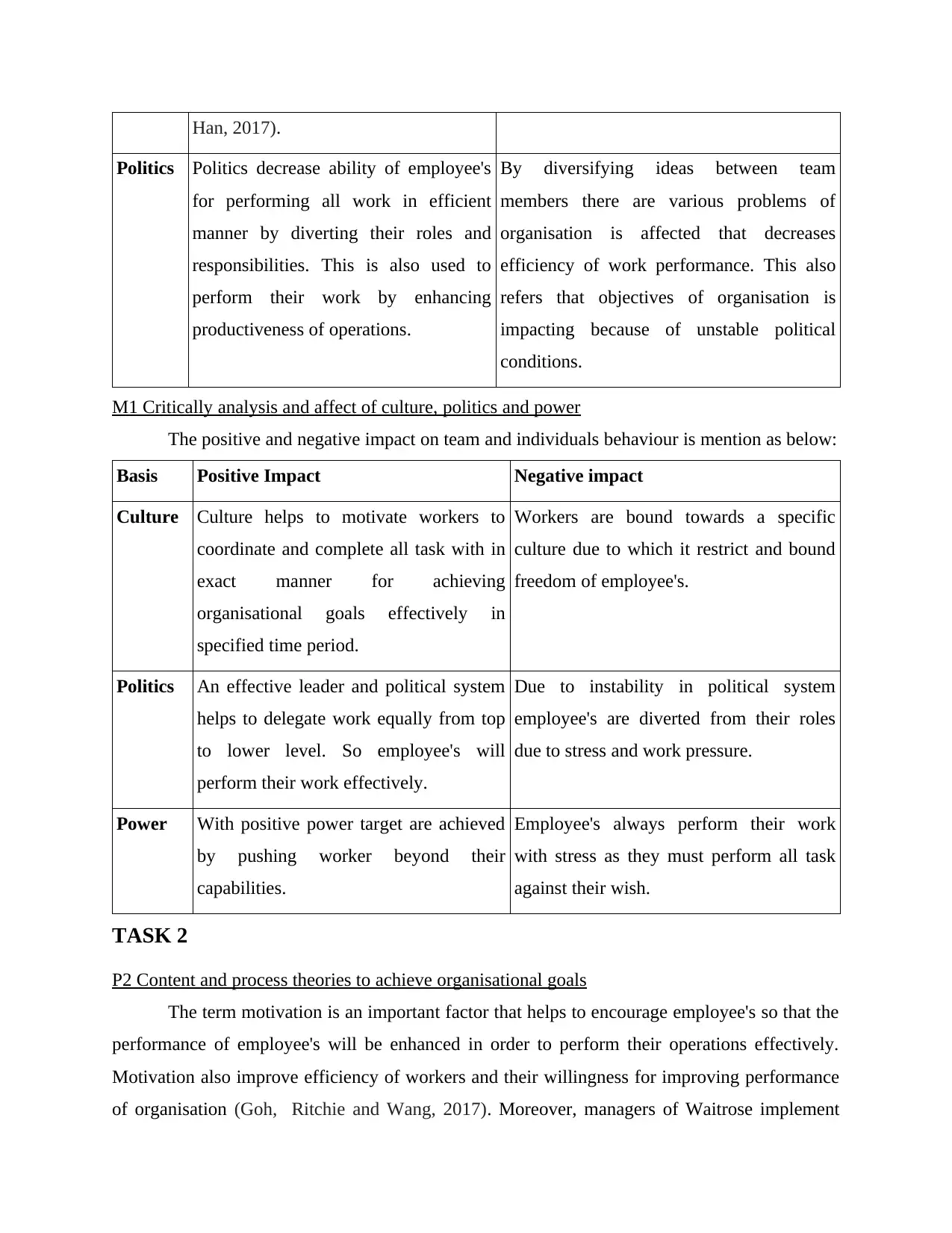
Han, 2017).
Politics Politics decrease ability of employee's
for performing all work in efficient
manner by diverting their roles and
responsibilities. This is also used to
perform their work by enhancing
productiveness of operations.
By diversifying ideas between team
members there are various problems of
organisation is affected that decreases
efficiency of work performance. This also
refers that objectives of organisation is
impacting because of unstable political
conditions.
M1 Critically analysis and affect of culture, politics and power
The positive and negative impact on team and individuals behaviour is mention as below:
Basis Positive Impact Negative impact
Culture Culture helps to motivate workers to
coordinate and complete all task with in
exact manner for achieving
organisational goals effectively in
specified time period.
Workers are bound towards a specific
culture due to which it restrict and bound
freedom of employee's.
Politics An effective leader and political system
helps to delegate work equally from top
to lower level. So employee's will
perform their work effectively.
Due to instability in political system
employee's are diverted from their roles
due to stress and work pressure.
Power With positive power target are achieved
by pushing worker beyond their
capabilities.
Employee's always perform their work
with stress as they must perform all task
against their wish.
TASK 2
P2 Content and process theories to achieve organisational goals
The term motivation is an important factor that helps to encourage employee's so that the
performance of employee's will be enhanced in order to perform their operations effectively.
Motivation also improve efficiency of workers and their willingness for improving performance
of organisation (Goh, Ritchie and Wang, 2017). Moreover, managers of Waitrose implement
Politics Politics decrease ability of employee's
for performing all work in efficient
manner by diverting their roles and
responsibilities. This is also used to
perform their work by enhancing
productiveness of operations.
By diversifying ideas between team
members there are various problems of
organisation is affected that decreases
efficiency of work performance. This also
refers that objectives of organisation is
impacting because of unstable political
conditions.
M1 Critically analysis and affect of culture, politics and power
The positive and negative impact on team and individuals behaviour is mention as below:
Basis Positive Impact Negative impact
Culture Culture helps to motivate workers to
coordinate and complete all task with in
exact manner for achieving
organisational goals effectively in
specified time period.
Workers are bound towards a specific
culture due to which it restrict and bound
freedom of employee's.
Politics An effective leader and political system
helps to delegate work equally from top
to lower level. So employee's will
perform their work effectively.
Due to instability in political system
employee's are diverted from their roles
due to stress and work pressure.
Power With positive power target are achieved
by pushing worker beyond their
capabilities.
Employee's always perform their work
with stress as they must perform all task
against their wish.
TASK 2
P2 Content and process theories to achieve organisational goals
The term motivation is an important factor that helps to encourage employee's so that the
performance of employee's will be enhanced in order to perform their operations effectively.
Motivation also improve efficiency of workers and their willingness for improving performance
of organisation (Goh, Ritchie and Wang, 2017). Moreover, managers of Waitrose implement
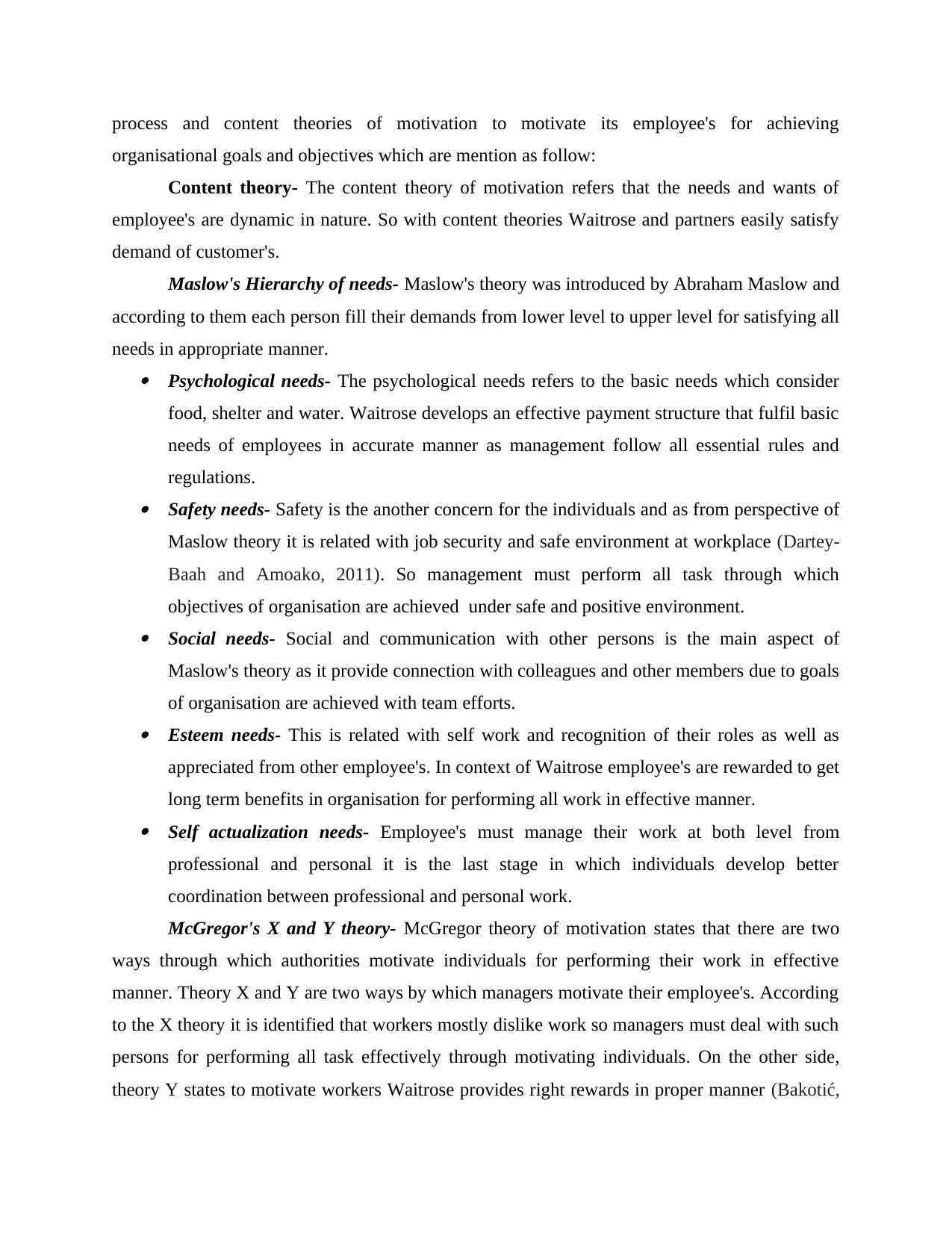
process and content theories of motivation to motivate its employee's for achieving
organisational goals and objectives which are mention as follow:
Content theory- The content theory of motivation refers that the needs and wants of
employee's are dynamic in nature. So with content theories Waitrose and partners easily satisfy
demand of customer's.
Maslow's Hierarchy of needs- Maslow's theory was introduced by Abraham Maslow and
according to them each person fill their demands from lower level to upper level for satisfying all
needs in appropriate manner. Psychological needs- The psychological needs refers to the basic needs which consider
food, shelter and water. Waitrose develops an effective payment structure that fulfil basic
needs of employees in accurate manner as management follow all essential rules and
regulations. Safety needs- Safety is the another concern for the individuals and as from perspective of
Maslow theory it is related with job security and safe environment at workplace (Dartey-
Baah and Amoako, 2011). So management must perform all task through which
objectives of organisation are achieved under safe and positive environment. Social needs- Social and communication with other persons is the main aspect of
Maslow's theory as it provide connection with colleagues and other members due to goals
of organisation are achieved with team efforts. Esteem needs- This is related with self work and recognition of their roles as well as
appreciated from other employee's. In context of Waitrose employee's are rewarded to get
long term benefits in organisation for performing all work in effective manner. Self actualization needs- Employee's must manage their work at both level from
professional and personal it is the last stage in which individuals develop better
coordination between professional and personal work.
McGregor's X and Y theory- McGregor theory of motivation states that there are two
ways through which authorities motivate individuals for performing their work in effective
manner. Theory X and Y are two ways by which managers motivate their employee's. According
to the X theory it is identified that workers mostly dislike work so managers must deal with such
persons for performing all task effectively through motivating individuals. On the other side,
theory Y states to motivate workers Waitrose provides right rewards in proper manner (Bakotić,
organisational goals and objectives which are mention as follow:
Content theory- The content theory of motivation refers that the needs and wants of
employee's are dynamic in nature. So with content theories Waitrose and partners easily satisfy
demand of customer's.
Maslow's Hierarchy of needs- Maslow's theory was introduced by Abraham Maslow and
according to them each person fill their demands from lower level to upper level for satisfying all
needs in appropriate manner. Psychological needs- The psychological needs refers to the basic needs which consider
food, shelter and water. Waitrose develops an effective payment structure that fulfil basic
needs of employees in accurate manner as management follow all essential rules and
regulations. Safety needs- Safety is the another concern for the individuals and as from perspective of
Maslow theory it is related with job security and safe environment at workplace (Dartey-
Baah and Amoako, 2011). So management must perform all task through which
objectives of organisation are achieved under safe and positive environment. Social needs- Social and communication with other persons is the main aspect of
Maslow's theory as it provide connection with colleagues and other members due to goals
of organisation are achieved with team efforts. Esteem needs- This is related with self work and recognition of their roles as well as
appreciated from other employee's. In context of Waitrose employee's are rewarded to get
long term benefits in organisation for performing all work in effective manner. Self actualization needs- Employee's must manage their work at both level from
professional and personal it is the last stage in which individuals develop better
coordination between professional and personal work.
McGregor's X and Y theory- McGregor theory of motivation states that there are two
ways through which authorities motivate individuals for performing their work in effective
manner. Theory X and Y are two ways by which managers motivate their employee's. According
to the X theory it is identified that workers mostly dislike work so managers must deal with such
persons for performing all task effectively through motivating individuals. On the other side,
theory Y states to motivate workers Waitrose provides right rewards in proper manner (Bakotić,
Secure Best Marks with AI Grader
Need help grading? Try our AI Grader for instant feedback on your assignments.
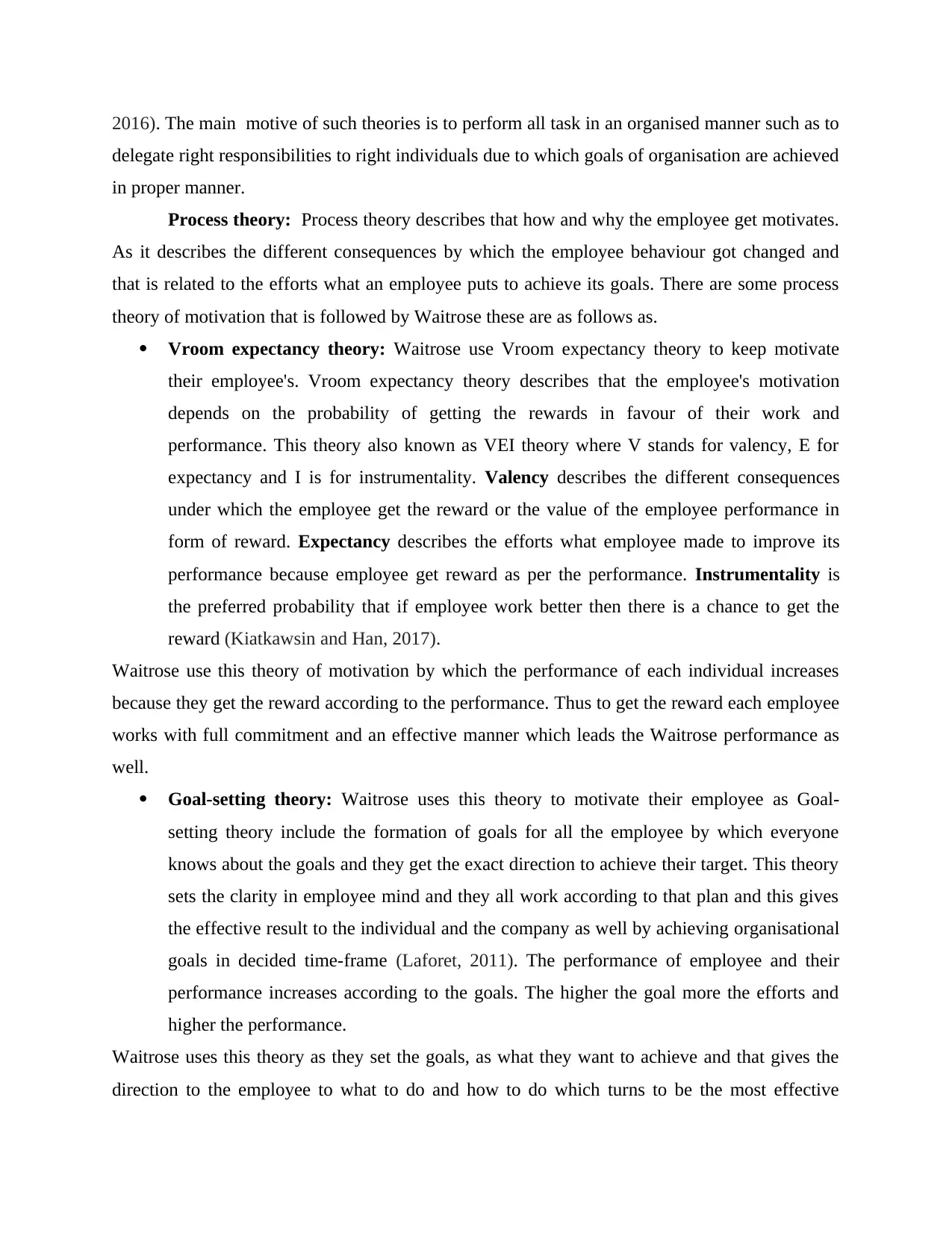
2016). The main motive of such theories is to perform all task in an organised manner such as to
delegate right responsibilities to right individuals due to which goals of organisation are achieved
in proper manner.
Process theory: Process theory describes that how and why the employee get motivates.
As it describes the different consequences by which the employee behaviour got changed and
that is related to the efforts what an employee puts to achieve its goals. There are some process
theory of motivation that is followed by Waitrose these are as follows as.
Vroom expectancy theory: Waitrose use Vroom expectancy theory to keep motivate
their employee's. Vroom expectancy theory describes that the employee's motivation
depends on the probability of getting the rewards in favour of their work and
performance. This theory also known as VEI theory where V stands for valency, E for
expectancy and I is for instrumentality. Valency describes the different consequences
under which the employee get the reward or the value of the employee performance in
form of reward. Expectancy describes the efforts what employee made to improve its
performance because employee get reward as per the performance. Instrumentality is
the preferred probability that if employee work better then there is a chance to get the
reward (Kiatkawsin and Han, 2017).
Waitrose use this theory of motivation by which the performance of each individual increases
because they get the reward according to the performance. Thus to get the reward each employee
works with full commitment and an effective manner which leads the Waitrose performance as
well.
Goal-setting theory: Waitrose uses this theory to motivate their employee as Goal-
setting theory include the formation of goals for all the employee by which everyone
knows about the goals and they get the exact direction to achieve their target. This theory
sets the clarity in employee mind and they all work according to that plan and this gives
the effective result to the individual and the company as well by achieving organisational
goals in decided time-frame (Laforet, 2011). The performance of employee and their
performance increases according to the goals. The higher the goal more the efforts and
higher the performance.
Waitrose uses this theory as they set the goals, as what they want to achieve and that gives the
direction to the employee to what to do and how to do which turns to be the most effective
delegate right responsibilities to right individuals due to which goals of organisation are achieved
in proper manner.
Process theory: Process theory describes that how and why the employee get motivates.
As it describes the different consequences by which the employee behaviour got changed and
that is related to the efforts what an employee puts to achieve its goals. There are some process
theory of motivation that is followed by Waitrose these are as follows as.
Vroom expectancy theory: Waitrose use Vroom expectancy theory to keep motivate
their employee's. Vroom expectancy theory describes that the employee's motivation
depends on the probability of getting the rewards in favour of their work and
performance. This theory also known as VEI theory where V stands for valency, E for
expectancy and I is for instrumentality. Valency describes the different consequences
under which the employee get the reward or the value of the employee performance in
form of reward. Expectancy describes the efforts what employee made to improve its
performance because employee get reward as per the performance. Instrumentality is
the preferred probability that if employee work better then there is a chance to get the
reward (Kiatkawsin and Han, 2017).
Waitrose use this theory of motivation by which the performance of each individual increases
because they get the reward according to the performance. Thus to get the reward each employee
works with full commitment and an effective manner which leads the Waitrose performance as
well.
Goal-setting theory: Waitrose uses this theory to motivate their employee as Goal-
setting theory include the formation of goals for all the employee by which everyone
knows about the goals and they get the exact direction to achieve their target. This theory
sets the clarity in employee mind and they all work according to that plan and this gives
the effective result to the individual and the company as well by achieving organisational
goals in decided time-frame (Laforet, 2011). The performance of employee and their
performance increases according to the goals. The higher the goal more the efforts and
higher the performance.
Waitrose uses this theory as they set the goals, as what they want to achieve and that gives the
direction to the employee to what to do and how to do which turns to be the most effective
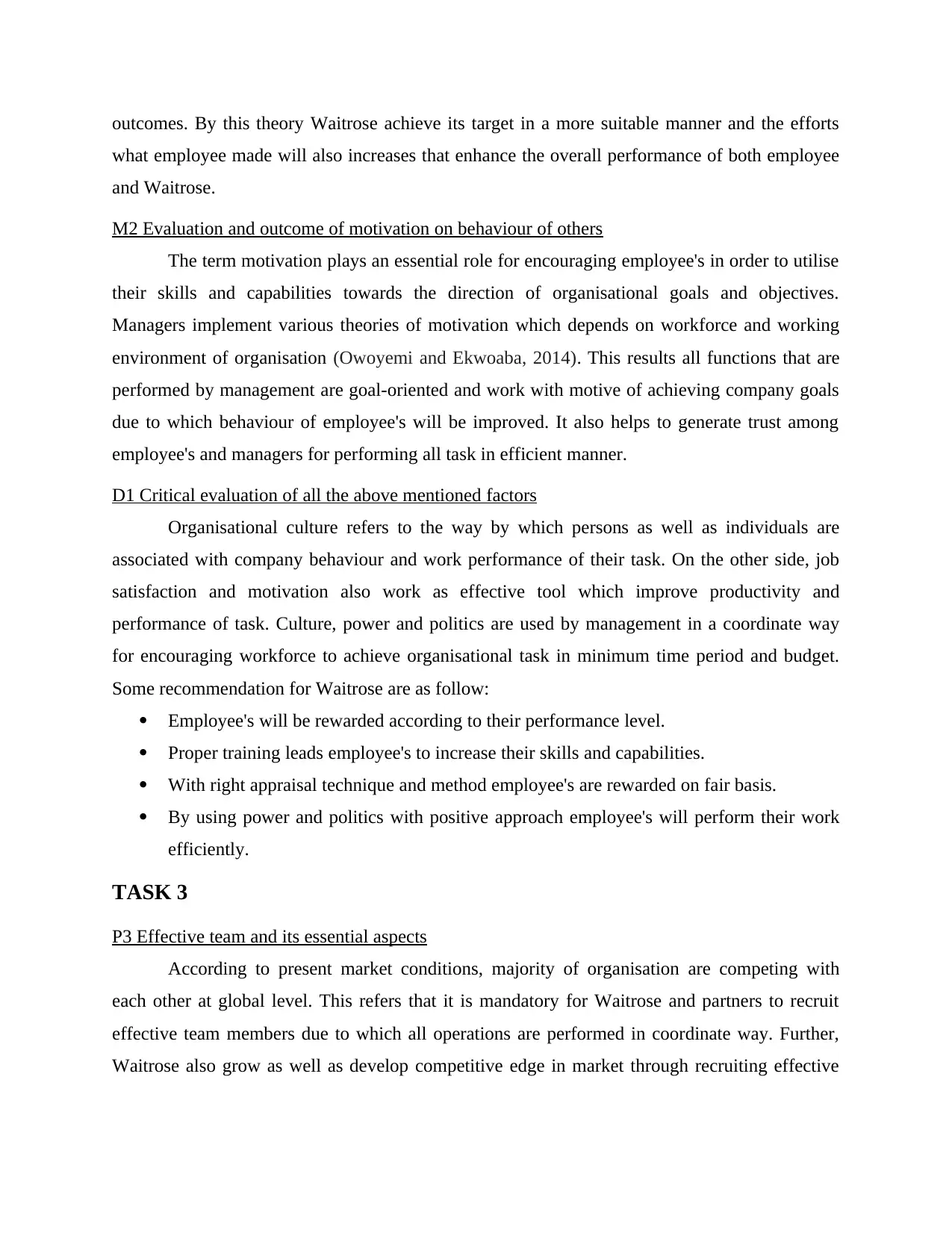
outcomes. By this theory Waitrose achieve its target in a more suitable manner and the efforts
what employee made will also increases that enhance the overall performance of both employee
and Waitrose.
M2 Evaluation and outcome of motivation on behaviour of others
The term motivation plays an essential role for encouraging employee's in order to utilise
their skills and capabilities towards the direction of organisational goals and objectives.
Managers implement various theories of motivation which depends on workforce and working
environment of organisation (Owoyemi and Ekwoaba, 2014). This results all functions that are
performed by management are goal-oriented and work with motive of achieving company goals
due to which behaviour of employee's will be improved. It also helps to generate trust among
employee's and managers for performing all task in efficient manner.
D1 Critical evaluation of all the above mentioned factors
Organisational culture refers to the way by which persons as well as individuals are
associated with company behaviour and work performance of their task. On the other side, job
satisfaction and motivation also work as effective tool which improve productivity and
performance of task. Culture, power and politics are used by management in a coordinate way
for encouraging workforce to achieve organisational task in minimum time period and budget.
Some recommendation for Waitrose are as follow:
Employee's will be rewarded according to their performance level.
Proper training leads employee's to increase their skills and capabilities.
With right appraisal technique and method employee's are rewarded on fair basis.
By using power and politics with positive approach employee's will perform their work
efficiently.
TASK 3
P3 Effective team and its essential aspects
According to present market conditions, majority of organisation are competing with
each other at global level. This refers that it is mandatory for Waitrose and partners to recruit
effective team members due to which all operations are performed in coordinate way. Further,
Waitrose also grow as well as develop competitive edge in market through recruiting effective
what employee made will also increases that enhance the overall performance of both employee
and Waitrose.
M2 Evaluation and outcome of motivation on behaviour of others
The term motivation plays an essential role for encouraging employee's in order to utilise
their skills and capabilities towards the direction of organisational goals and objectives.
Managers implement various theories of motivation which depends on workforce and working
environment of organisation (Owoyemi and Ekwoaba, 2014). This results all functions that are
performed by management are goal-oriented and work with motive of achieving company goals
due to which behaviour of employee's will be improved. It also helps to generate trust among
employee's and managers for performing all task in efficient manner.
D1 Critical evaluation of all the above mentioned factors
Organisational culture refers to the way by which persons as well as individuals are
associated with company behaviour and work performance of their task. On the other side, job
satisfaction and motivation also work as effective tool which improve productivity and
performance of task. Culture, power and politics are used by management in a coordinate way
for encouraging workforce to achieve organisational task in minimum time period and budget.
Some recommendation for Waitrose are as follow:
Employee's will be rewarded according to their performance level.
Proper training leads employee's to increase their skills and capabilities.
With right appraisal technique and method employee's are rewarded on fair basis.
By using power and politics with positive approach employee's will perform their work
efficiently.
TASK 3
P3 Effective team and its essential aspects
According to present market conditions, majority of organisation are competing with
each other at global level. This refers that it is mandatory for Waitrose and partners to recruit
effective team members due to which all operations are performed in coordinate way. Further,
Waitrose also grow as well as develop competitive edge in market through recruiting effective
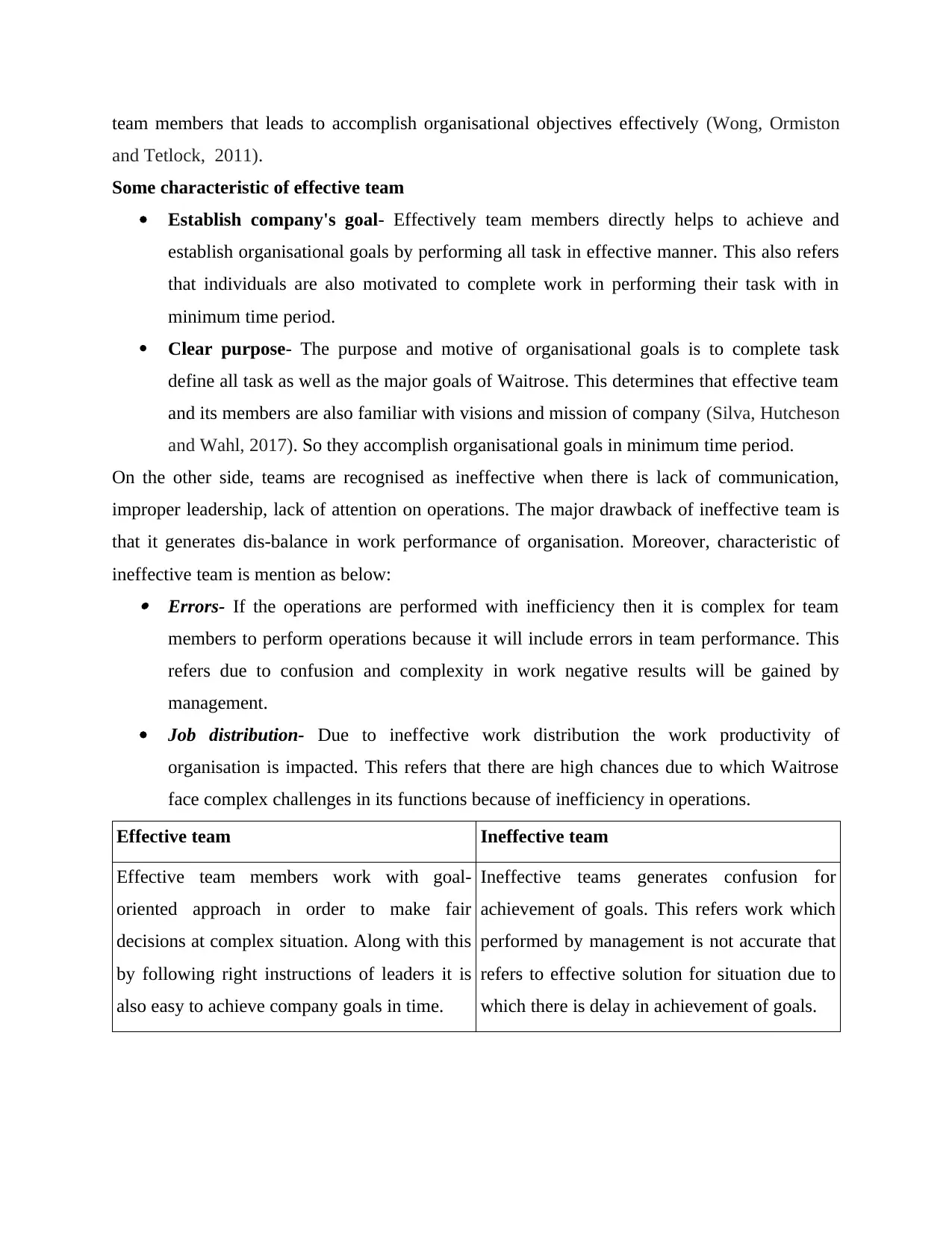
team members that leads to accomplish organisational objectives effectively (Wong, Ormiston
and Tetlock, 2011).
Some characteristic of effective team
Establish company's goal- Effectively team members directly helps to achieve and
establish organisational goals by performing all task in effective manner. This also refers
that individuals are also motivated to complete work in performing their task with in
minimum time period.
Clear purpose- The purpose and motive of organisational goals is to complete task
define all task as well as the major goals of Waitrose. This determines that effective team
and its members are also familiar with visions and mission of company (Silva, Hutcheson
and Wahl, 2017). So they accomplish organisational goals in minimum time period.
On the other side, teams are recognised as ineffective when there is lack of communication,
improper leadership, lack of attention on operations. The major drawback of ineffective team is
that it generates dis-balance in work performance of organisation. Moreover, characteristic of
ineffective team is mention as below: Errors- If the operations are performed with inefficiency then it is complex for team
members to perform operations because it will include errors in team performance. This
refers due to confusion and complexity in work negative results will be gained by
management.
Job distribution- Due to ineffective work distribution the work productivity of
organisation is impacted. This refers that there are high chances due to which Waitrose
face complex challenges in its functions because of inefficiency in operations.
Effective team Ineffective team
Effective team members work with goal-
oriented approach in order to make fair
decisions at complex situation. Along with this
by following right instructions of leaders it is
also easy to achieve company goals in time.
Ineffective teams generates confusion for
achievement of goals. This refers work which
performed by management is not accurate that
refers to effective solution for situation due to
which there is delay in achievement of goals.
and Tetlock, 2011).
Some characteristic of effective team
Establish company's goal- Effectively team members directly helps to achieve and
establish organisational goals by performing all task in effective manner. This also refers
that individuals are also motivated to complete work in performing their task with in
minimum time period.
Clear purpose- The purpose and motive of organisational goals is to complete task
define all task as well as the major goals of Waitrose. This determines that effective team
and its members are also familiar with visions and mission of company (Silva, Hutcheson
and Wahl, 2017). So they accomplish organisational goals in minimum time period.
On the other side, teams are recognised as ineffective when there is lack of communication,
improper leadership, lack of attention on operations. The major drawback of ineffective team is
that it generates dis-balance in work performance of organisation. Moreover, characteristic of
ineffective team is mention as below: Errors- If the operations are performed with inefficiency then it is complex for team
members to perform operations because it will include errors in team performance. This
refers due to confusion and complexity in work negative results will be gained by
management.
Job distribution- Due to ineffective work distribution the work productivity of
organisation is impacted. This refers that there are high chances due to which Waitrose
face complex challenges in its functions because of inefficiency in operations.
Effective team Ineffective team
Effective team members work with goal-
oriented approach in order to make fair
decisions at complex situation. Along with this
by following right instructions of leaders it is
also easy to achieve company goals in time.
Ineffective teams generates confusion for
achievement of goals. This refers work which
performed by management is not accurate that
refers to effective solution for situation due to
which there is delay in achievement of goals.
Paraphrase This Document
Need a fresh take? Get an instant paraphrase of this document with our AI Paraphraser
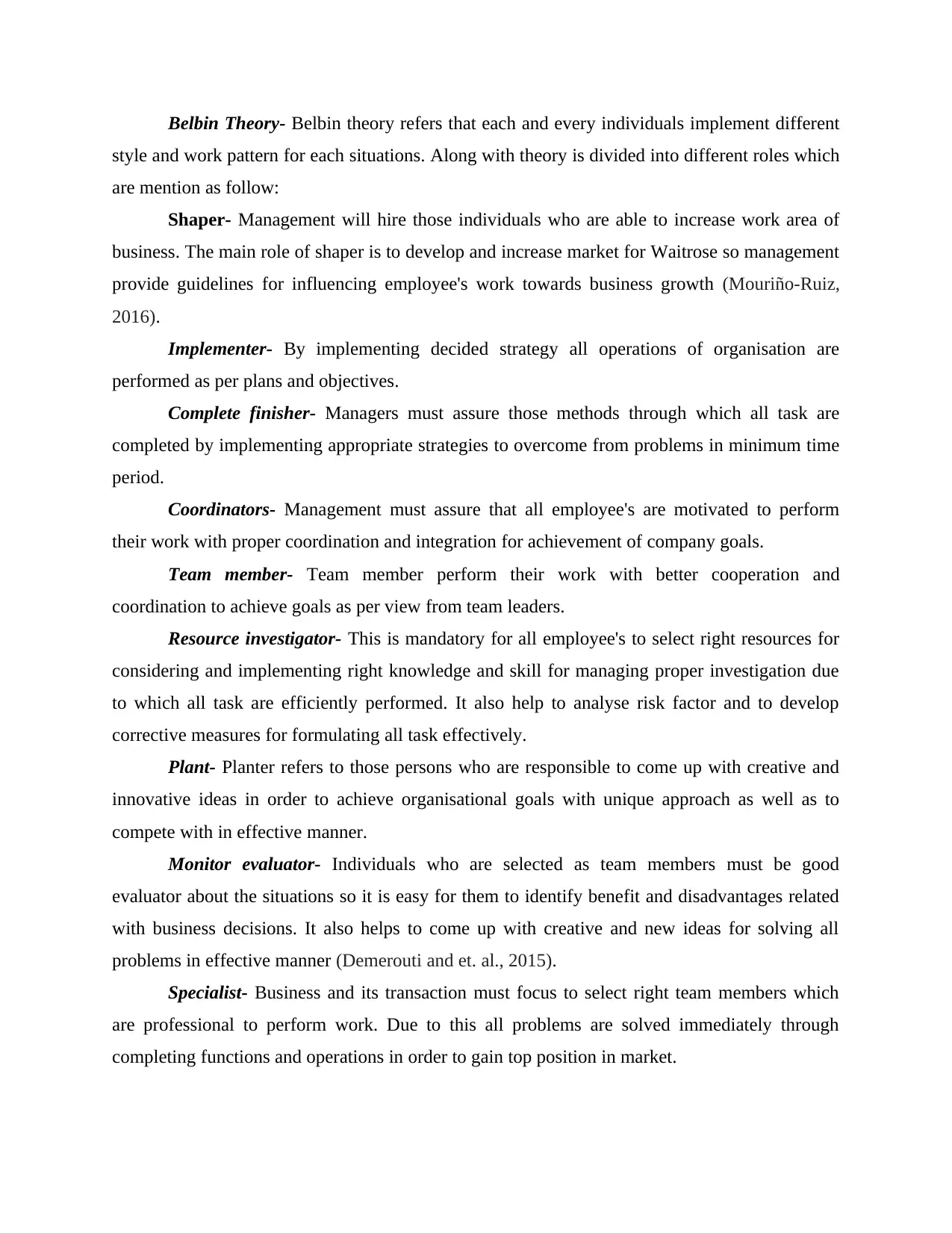
Belbin Theory- Belbin theory refers that each and every individuals implement different
style and work pattern for each situations. Along with theory is divided into different roles which
are mention as follow:
Shaper- Management will hire those individuals who are able to increase work area of
business. The main role of shaper is to develop and increase market for Waitrose so management
provide guidelines for influencing employee's work towards business growth (Mouriño-Ruiz,
2016).
Implementer- By implementing decided strategy all operations of organisation are
performed as per plans and objectives.
Complete finisher- Managers must assure those methods through which all task are
completed by implementing appropriate strategies to overcome from problems in minimum time
period.
Coordinators- Management must assure that all employee's are motivated to perform
their work with proper coordination and integration for achievement of company goals.
Team member- Team member perform their work with better cooperation and
coordination to achieve goals as per view from team leaders.
Resource investigator- This is mandatory for all employee's to select right resources for
considering and implementing right knowledge and skill for managing proper investigation due
to which all task are efficiently performed. It also help to analyse risk factor and to develop
corrective measures for formulating all task effectively.
Plant- Planter refers to those persons who are responsible to come up with creative and
innovative ideas in order to achieve organisational goals with unique approach as well as to
compete with in effective manner.
Monitor evaluator- Individuals who are selected as team members must be good
evaluator about the situations so it is easy for them to identify benefit and disadvantages related
with business decisions. It also helps to come up with creative and new ideas for solving all
problems in effective manner (Demerouti and et. al., 2015).
Specialist- Business and its transaction must focus to select right team members which
are professional to perform work. Due to this all problems are solved immediately through
completing functions and operations in order to gain top position in market.
style and work pattern for each situations. Along with theory is divided into different roles which
are mention as follow:
Shaper- Management will hire those individuals who are able to increase work area of
business. The main role of shaper is to develop and increase market for Waitrose so management
provide guidelines for influencing employee's work towards business growth (Mouriño-Ruiz,
2016).
Implementer- By implementing decided strategy all operations of organisation are
performed as per plans and objectives.
Complete finisher- Managers must assure those methods through which all task are
completed by implementing appropriate strategies to overcome from problems in minimum time
period.
Coordinators- Management must assure that all employee's are motivated to perform
their work with proper coordination and integration for achievement of company goals.
Team member- Team member perform their work with better cooperation and
coordination to achieve goals as per view from team leaders.
Resource investigator- This is mandatory for all employee's to select right resources for
considering and implementing right knowledge and skill for managing proper investigation due
to which all task are efficiently performed. It also help to analyse risk factor and to develop
corrective measures for formulating all task effectively.
Plant- Planter refers to those persons who are responsible to come up with creative and
innovative ideas in order to achieve organisational goals with unique approach as well as to
compete with in effective manner.
Monitor evaluator- Individuals who are selected as team members must be good
evaluator about the situations so it is easy for them to identify benefit and disadvantages related
with business decisions. It also helps to come up with creative and new ideas for solving all
problems in effective manner (Demerouti and et. al., 2015).
Specialist- Business and its transaction must focus to select right team members which
are professional to perform work. Due to this all problems are solved immediately through
completing functions and operations in order to gain top position in market.
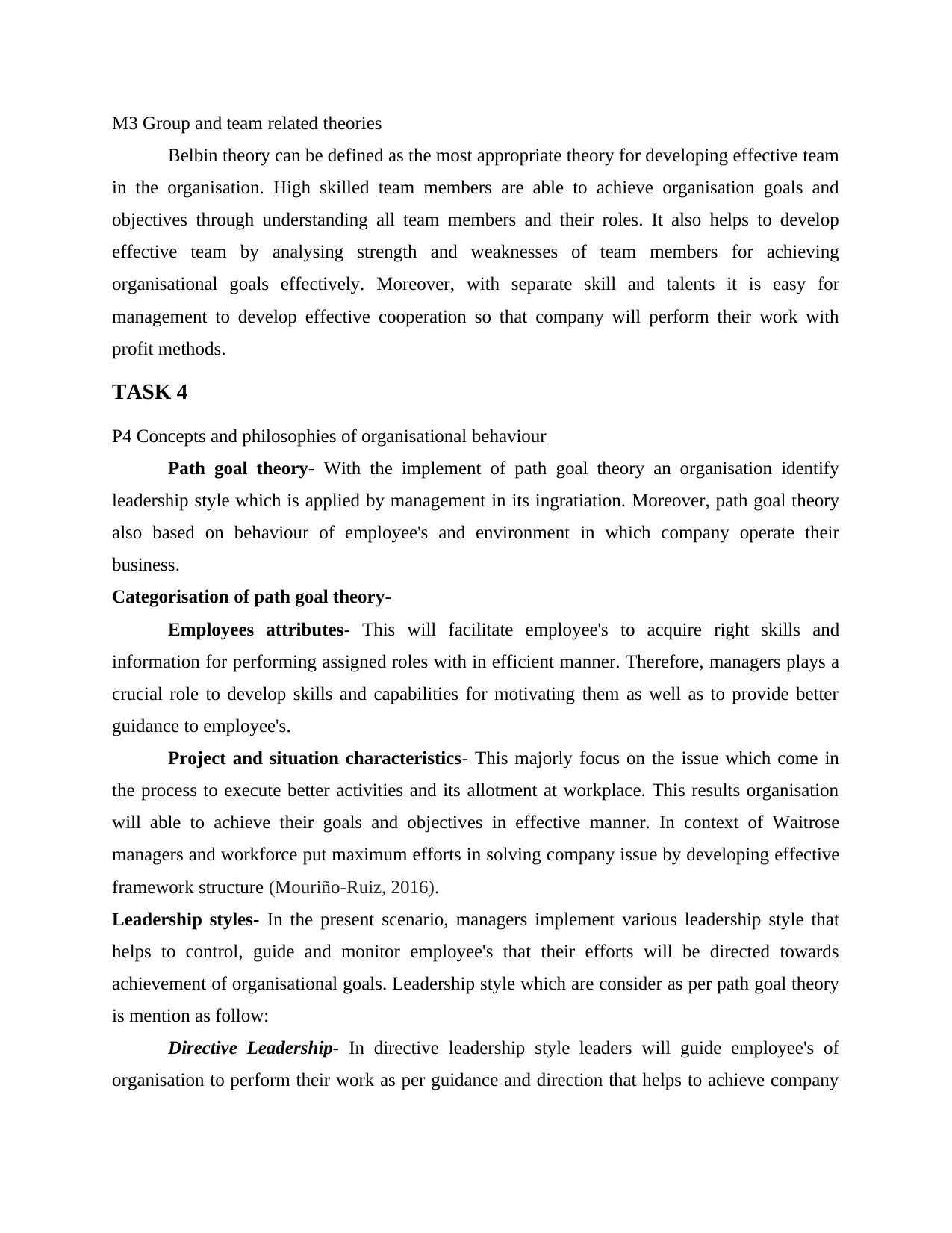
M3 Group and team related theories
Belbin theory can be defined as the most appropriate theory for developing effective team
in the organisation. High skilled team members are able to achieve organisation goals and
objectives through understanding all team members and their roles. It also helps to develop
effective team by analysing strength and weaknesses of team members for achieving
organisational goals effectively. Moreover, with separate skill and talents it is easy for
management to develop effective cooperation so that company will perform their work with
profit methods.
TASK 4
P4 Concepts and philosophies of organisational behaviour
Path goal theory- With the implement of path goal theory an organisation identify
leadership style which is applied by management in its ingratiation. Moreover, path goal theory
also based on behaviour of employee's and environment in which company operate their
business.
Categorisation of path goal theory-
Employees attributes- This will facilitate employee's to acquire right skills and
information for performing assigned roles with in efficient manner. Therefore, managers plays a
crucial role to develop skills and capabilities for motivating them as well as to provide better
guidance to employee's.
Project and situation characteristics- This majorly focus on the issue which come in
the process to execute better activities and its allotment at workplace. This results organisation
will able to achieve their goals and objectives in effective manner. In context of Waitrose
managers and workforce put maximum efforts in solving company issue by developing effective
framework structure (Mouriño-Ruiz, 2016).
Leadership styles- In the present scenario, managers implement various leadership style that
helps to control, guide and monitor employee's that their efforts will be directed towards
achievement of organisational goals. Leadership style which are consider as per path goal theory
is mention as follow:
Directive Leadership- In directive leadership style leaders will guide employee's of
organisation to perform their work as per guidance and direction that helps to achieve company
Belbin theory can be defined as the most appropriate theory for developing effective team
in the organisation. High skilled team members are able to achieve organisation goals and
objectives through understanding all team members and their roles. It also helps to develop
effective team by analysing strength and weaknesses of team members for achieving
organisational goals effectively. Moreover, with separate skill and talents it is easy for
management to develop effective cooperation so that company will perform their work with
profit methods.
TASK 4
P4 Concepts and philosophies of organisational behaviour
Path goal theory- With the implement of path goal theory an organisation identify
leadership style which is applied by management in its ingratiation. Moreover, path goal theory
also based on behaviour of employee's and environment in which company operate their
business.
Categorisation of path goal theory-
Employees attributes- This will facilitate employee's to acquire right skills and
information for performing assigned roles with in efficient manner. Therefore, managers plays a
crucial role to develop skills and capabilities for motivating them as well as to provide better
guidance to employee's.
Project and situation characteristics- This majorly focus on the issue which come in
the process to execute better activities and its allotment at workplace. This results organisation
will able to achieve their goals and objectives in effective manner. In context of Waitrose
managers and workforce put maximum efforts in solving company issue by developing effective
framework structure (Mouriño-Ruiz, 2016).
Leadership styles- In the present scenario, managers implement various leadership style that
helps to control, guide and monitor employee's that their efforts will be directed towards
achievement of organisational goals. Leadership style which are consider as per path goal theory
is mention as follow:
Directive Leadership- In directive leadership style leaders will guide employee's of
organisation to perform their work as per guidance and direction that helps to achieve company
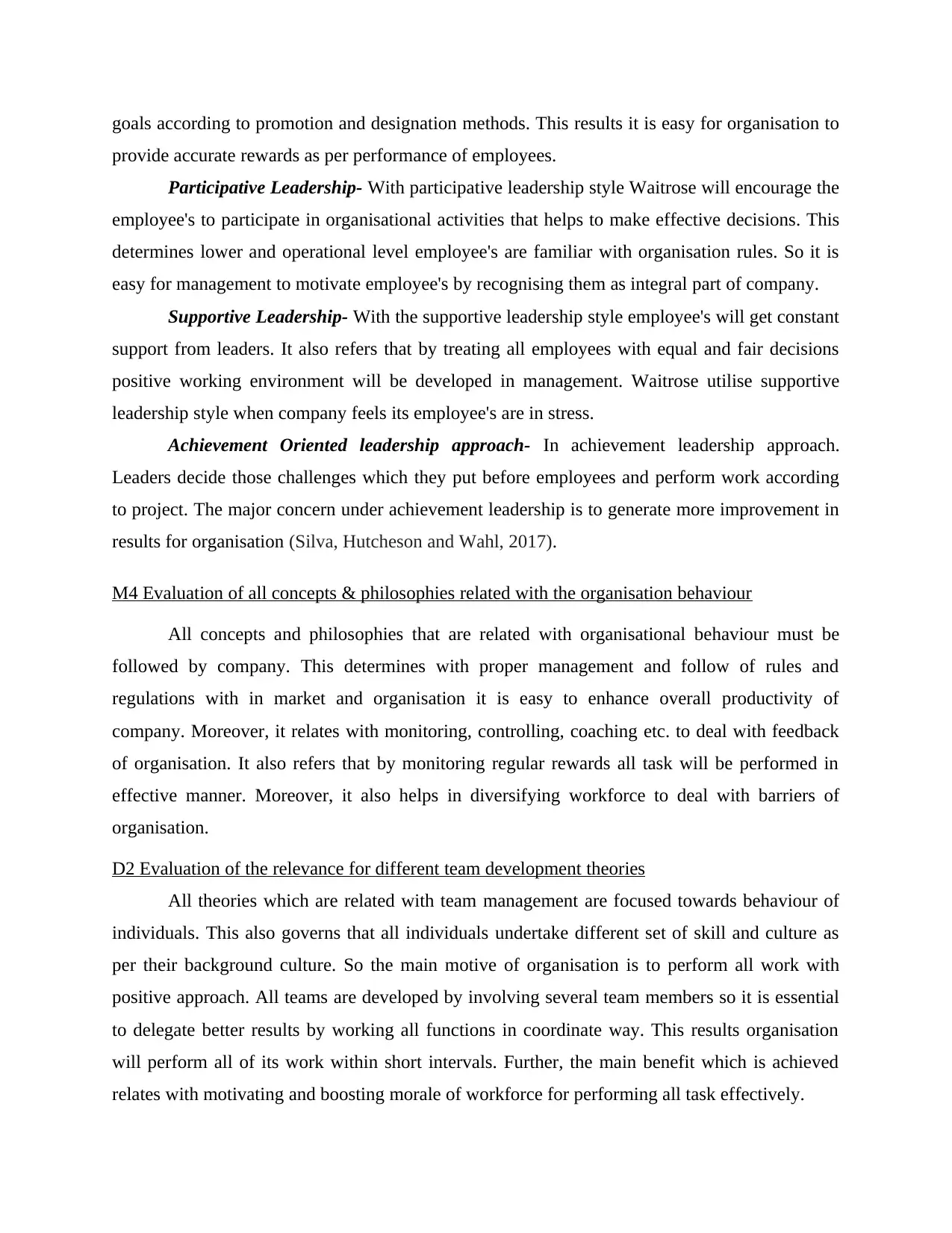
goals according to promotion and designation methods. This results it is easy for organisation to
provide accurate rewards as per performance of employees.
Participative Leadership- With participative leadership style Waitrose will encourage the
employee's to participate in organisational activities that helps to make effective decisions. This
determines lower and operational level employee's are familiar with organisation rules. So it is
easy for management to motivate employee's by recognising them as integral part of company.
Supportive Leadership- With the supportive leadership style employee's will get constant
support from leaders. It also refers that by treating all employees with equal and fair decisions
positive working environment will be developed in management. Waitrose utilise supportive
leadership style when company feels its employee's are in stress.
Achievement Oriented leadership approach- In achievement leadership approach.
Leaders decide those challenges which they put before employees and perform work according
to project. The major concern under achievement leadership is to generate more improvement in
results for organisation (Silva, Hutcheson and Wahl, 2017).
M4 Evaluation of all concepts & philosophies related with the organisation behaviour
All concepts and philosophies that are related with organisational behaviour must be
followed by company. This determines with proper management and follow of rules and
regulations with in market and organisation it is easy to enhance overall productivity of
company. Moreover, it relates with monitoring, controlling, coaching etc. to deal with feedback
of organisation. It also refers that by monitoring regular rewards all task will be performed in
effective manner. Moreover, it also helps in diversifying workforce to deal with barriers of
organisation.
D2 Evaluation of the relevance for different team development theories
All theories which are related with team management are focused towards behaviour of
individuals. This also governs that all individuals undertake different set of skill and culture as
per their background culture. So the main motive of organisation is to perform all work with
positive approach. All teams are developed by involving several team members so it is essential
to delegate better results by working all functions in coordinate way. This results organisation
will perform all of its work within short intervals. Further, the main benefit which is achieved
relates with motivating and boosting morale of workforce for performing all task effectively.
provide accurate rewards as per performance of employees.
Participative Leadership- With participative leadership style Waitrose will encourage the
employee's to participate in organisational activities that helps to make effective decisions. This
determines lower and operational level employee's are familiar with organisation rules. So it is
easy for management to motivate employee's by recognising them as integral part of company.
Supportive Leadership- With the supportive leadership style employee's will get constant
support from leaders. It also refers that by treating all employees with equal and fair decisions
positive working environment will be developed in management. Waitrose utilise supportive
leadership style when company feels its employee's are in stress.
Achievement Oriented leadership approach- In achievement leadership approach.
Leaders decide those challenges which they put before employees and perform work according
to project. The major concern under achievement leadership is to generate more improvement in
results for organisation (Silva, Hutcheson and Wahl, 2017).
M4 Evaluation of all concepts & philosophies related with the organisation behaviour
All concepts and philosophies that are related with organisational behaviour must be
followed by company. This determines with proper management and follow of rules and
regulations with in market and organisation it is easy to enhance overall productivity of
company. Moreover, it relates with monitoring, controlling, coaching etc. to deal with feedback
of organisation. It also refers that by monitoring regular rewards all task will be performed in
effective manner. Moreover, it also helps in diversifying workforce to deal with barriers of
organisation.
D2 Evaluation of the relevance for different team development theories
All theories which are related with team management are focused towards behaviour of
individuals. This also governs that all individuals undertake different set of skill and culture as
per their background culture. So the main motive of organisation is to perform all work with
positive approach. All teams are developed by involving several team members so it is essential
to delegate better results by working all functions in coordinate way. This results organisation
will perform all of its work within short intervals. Further, the main benefit which is achieved
relates with motivating and boosting morale of workforce for performing all task effectively.
Secure Best Marks with AI Grader
Need help grading? Try our AI Grader for instant feedback on your assignments.
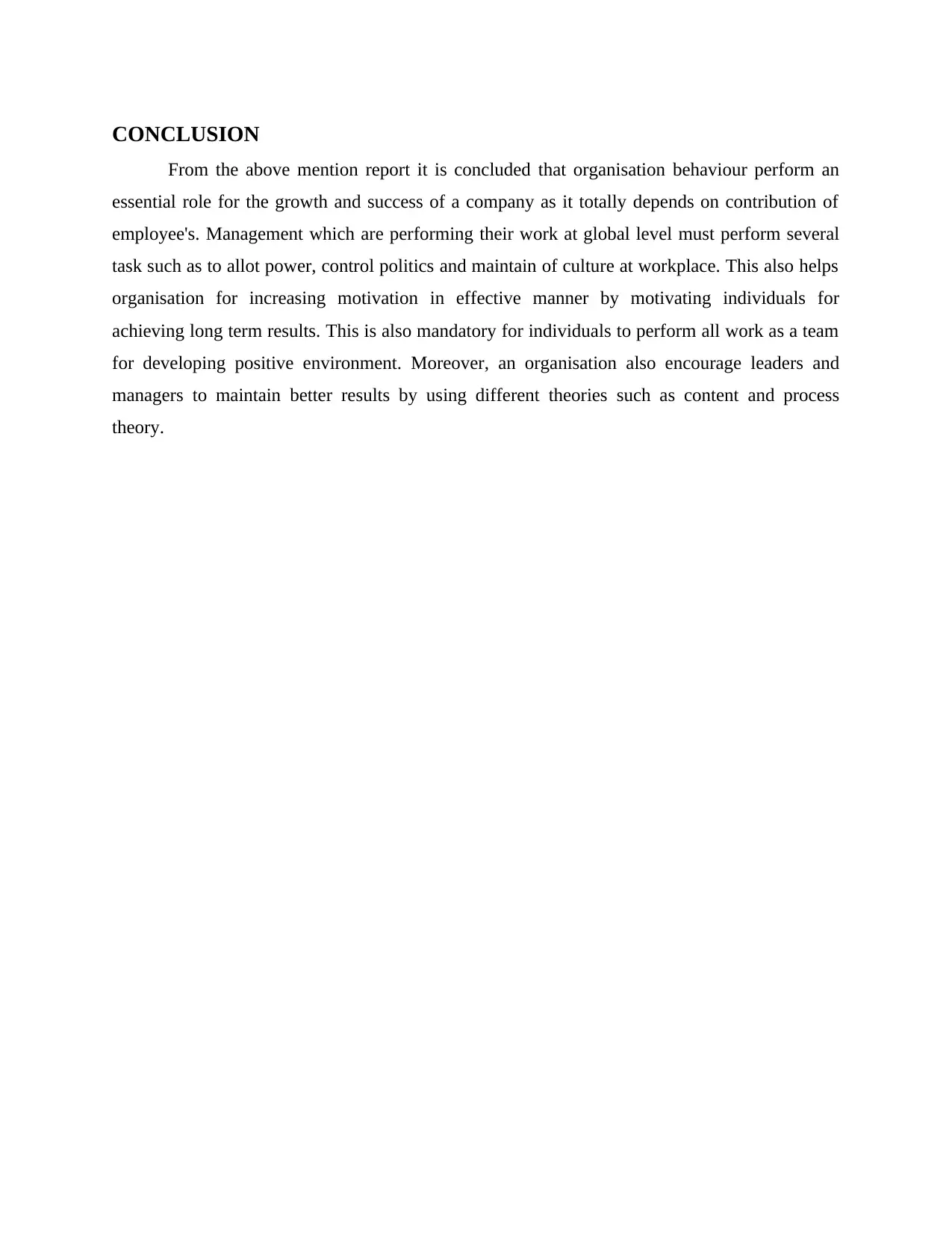
CONCLUSION
From the above mention report it is concluded that organisation behaviour perform an
essential role for the growth and success of a company as it totally depends on contribution of
employee's. Management which are performing their work at global level must perform several
task such as to allot power, control politics and maintain of culture at workplace. This also helps
organisation for increasing motivation in effective manner by motivating individuals for
achieving long term results. This is also mandatory for individuals to perform all work as a team
for developing positive environment. Moreover, an organisation also encourage leaders and
managers to maintain better results by using different theories such as content and process
theory.
From the above mention report it is concluded that organisation behaviour perform an
essential role for the growth and success of a company as it totally depends on contribution of
employee's. Management which are performing their work at global level must perform several
task such as to allot power, control politics and maintain of culture at workplace. This also helps
organisation for increasing motivation in effective manner by motivating individuals for
achieving long term results. This is also mandatory for individuals to perform all work as a team
for developing positive environment. Moreover, an organisation also encourage leaders and
managers to maintain better results by using different theories such as content and process
theory.
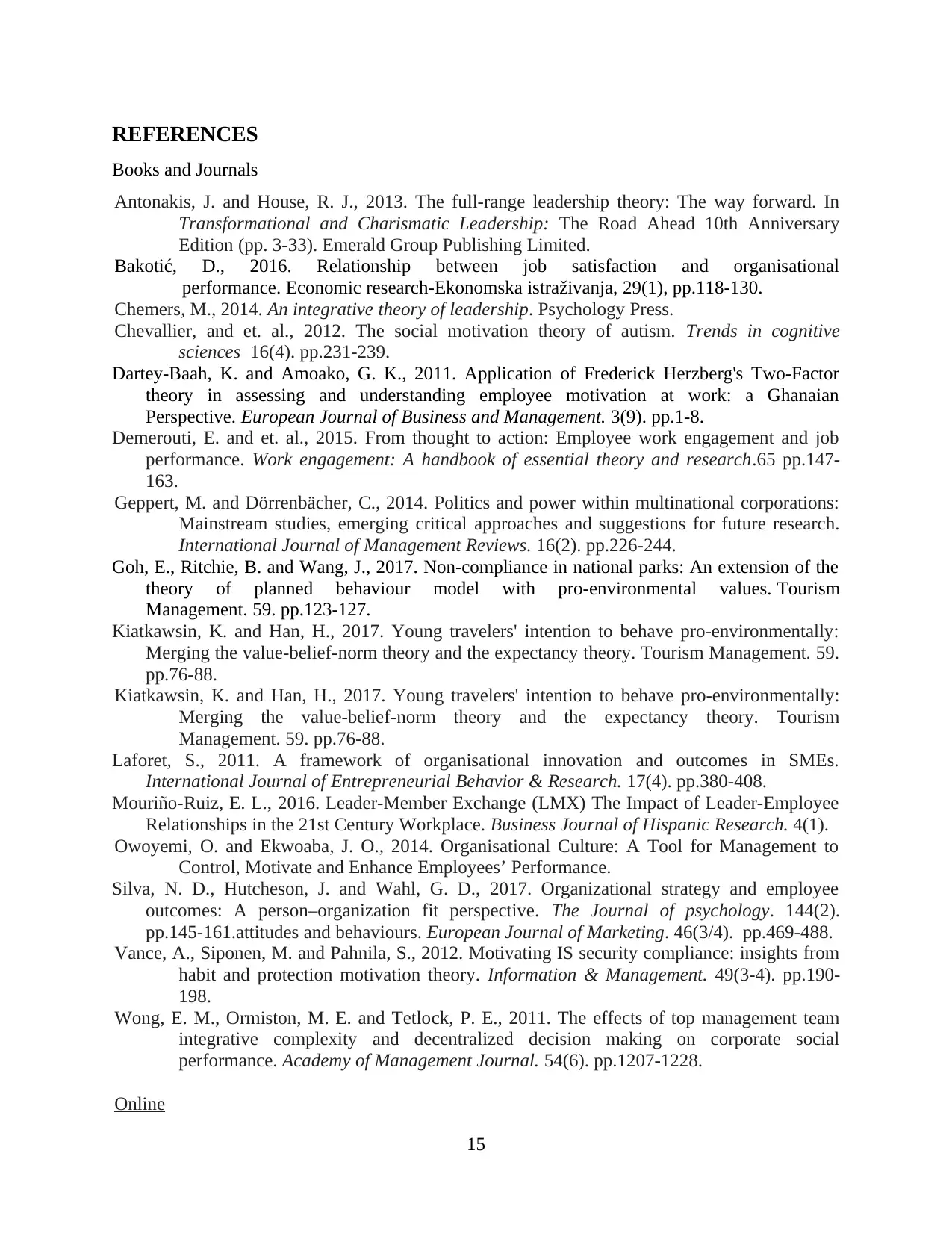
REFERENCES
Books and Journals
Antonakis, J. and House, R. J., 2013. The full-range leadership theory: The way forward. In
Transformational and Charismatic Leadership: The Road Ahead 10th Anniversary
Edition (pp. 3-33). Emerald Group Publishing Limited.
Bakotić, D., 2016. Relationship between job satisfaction and organisational
performance. Economic research-Ekonomska istraživanja, 29(1), pp.118-130.
Chemers, M., 2014. An integrative theory of leadership. Psychology Press.
Chevallier, and et. al., 2012. The social motivation theory of autism. Trends in cognitive
sciences 16(4). pp.231-239.
Dartey-Baah, K. and Amoako, G. K., 2011. Application of Frederick Herzberg's Two-Factor
theory in assessing and understanding employee motivation at work: a Ghanaian
Perspective. European Journal of Business and Management. 3(9). pp.1-8.
Demerouti, E. and et. al., 2015. From thought to action: Employee work engagement and job
performance. Work engagement: A handbook of essential theory and research.65 pp.147-
163.
Geppert, M. and Dörrenbächer, C., 2014. Politics and power within multinational corporations:
Mainstream studies, emerging critical approaches and suggestions for future research.
International Journal of Management Reviews. 16(2). pp.226-244.
Goh, E., Ritchie, B. and Wang, J., 2017. Non-compliance in national parks: An extension of the
theory of planned behaviour model with pro-environmental values. Tourism
Management. 59. pp.123-127.
Kiatkawsin, K. and Han, H., 2017. Young travelers' intention to behave pro-environmentally:
Merging the value-belief-norm theory and the expectancy theory. Tourism Management. 59.
pp.76-88.
Kiatkawsin, K. and Han, H., 2017. Young travelers' intention to behave pro-environmentally:
Merging the value-belief-norm theory and the expectancy theory. Tourism
Management. 59. pp.76-88.
Laforet, S., 2011. A framework of organisational innovation and outcomes in SMEs.
International Journal of Entrepreneurial Behavior & Research. 17(4). pp.380-408.
Mouriño-Ruiz, E. L., 2016. Leader-Member Exchange (LMX) The Impact of Leader-Employee
Relationships in the 21st Century Workplace. Business Journal of Hispanic Research. 4(1).
Owoyemi, O. and Ekwoaba, J. O., 2014. Organisational Culture: A Tool for Management to
Control, Motivate and Enhance Employees’ Performance.
Silva, N. D., Hutcheson, J. and Wahl, G. D., 2017. Organizational strategy and employee
outcomes: A person–organization fit perspective. The Journal of psychology. 144(2).
pp.145-161.attitudes and behaviours. European Journal of Marketing. 46(3/4). pp.469-488.
Vance, A., Siponen, M. and Pahnila, S., 2012. Motivating IS security compliance: insights from
habit and protection motivation theory. Information & Management. 49(3-4). pp.190-
198.
Wong, E. M., Ormiston, M. E. and Tetlock, P. E., 2011. The effects of top management team
integrative complexity and decentralized decision making on corporate social
performance. Academy of Management Journal. 54(6). pp.1207-1228.
Online
15
Books and Journals
Antonakis, J. and House, R. J., 2013. The full-range leadership theory: The way forward. In
Transformational and Charismatic Leadership: The Road Ahead 10th Anniversary
Edition (pp. 3-33). Emerald Group Publishing Limited.
Bakotić, D., 2016. Relationship between job satisfaction and organisational
performance. Economic research-Ekonomska istraživanja, 29(1), pp.118-130.
Chemers, M., 2014. An integrative theory of leadership. Psychology Press.
Chevallier, and et. al., 2012. The social motivation theory of autism. Trends in cognitive
sciences 16(4). pp.231-239.
Dartey-Baah, K. and Amoako, G. K., 2011. Application of Frederick Herzberg's Two-Factor
theory in assessing and understanding employee motivation at work: a Ghanaian
Perspective. European Journal of Business and Management. 3(9). pp.1-8.
Demerouti, E. and et. al., 2015. From thought to action: Employee work engagement and job
performance. Work engagement: A handbook of essential theory and research.65 pp.147-
163.
Geppert, M. and Dörrenbächer, C., 2014. Politics and power within multinational corporations:
Mainstream studies, emerging critical approaches and suggestions for future research.
International Journal of Management Reviews. 16(2). pp.226-244.
Goh, E., Ritchie, B. and Wang, J., 2017. Non-compliance in national parks: An extension of the
theory of planned behaviour model with pro-environmental values. Tourism
Management. 59. pp.123-127.
Kiatkawsin, K. and Han, H., 2017. Young travelers' intention to behave pro-environmentally:
Merging the value-belief-norm theory and the expectancy theory. Tourism Management. 59.
pp.76-88.
Kiatkawsin, K. and Han, H., 2017. Young travelers' intention to behave pro-environmentally:
Merging the value-belief-norm theory and the expectancy theory. Tourism
Management. 59. pp.76-88.
Laforet, S., 2011. A framework of organisational innovation and outcomes in SMEs.
International Journal of Entrepreneurial Behavior & Research. 17(4). pp.380-408.
Mouriño-Ruiz, E. L., 2016. Leader-Member Exchange (LMX) The Impact of Leader-Employee
Relationships in the 21st Century Workplace. Business Journal of Hispanic Research. 4(1).
Owoyemi, O. and Ekwoaba, J. O., 2014. Organisational Culture: A Tool for Management to
Control, Motivate and Enhance Employees’ Performance.
Silva, N. D., Hutcheson, J. and Wahl, G. D., 2017. Organizational strategy and employee
outcomes: A person–organization fit perspective. The Journal of psychology. 144(2).
pp.145-161.attitudes and behaviours. European Journal of Marketing. 46(3/4). pp.469-488.
Vance, A., Siponen, M. and Pahnila, S., 2012. Motivating IS security compliance: insights from
habit and protection motivation theory. Information & Management. 49(3-4). pp.190-
198.
Wong, E. M., Ormiston, M. E. and Tetlock, P. E., 2011. The effects of top management team
integrative complexity and decentralized decision making on corporate social
performance. Academy of Management Journal. 54(6). pp.1207-1228.
Online
15
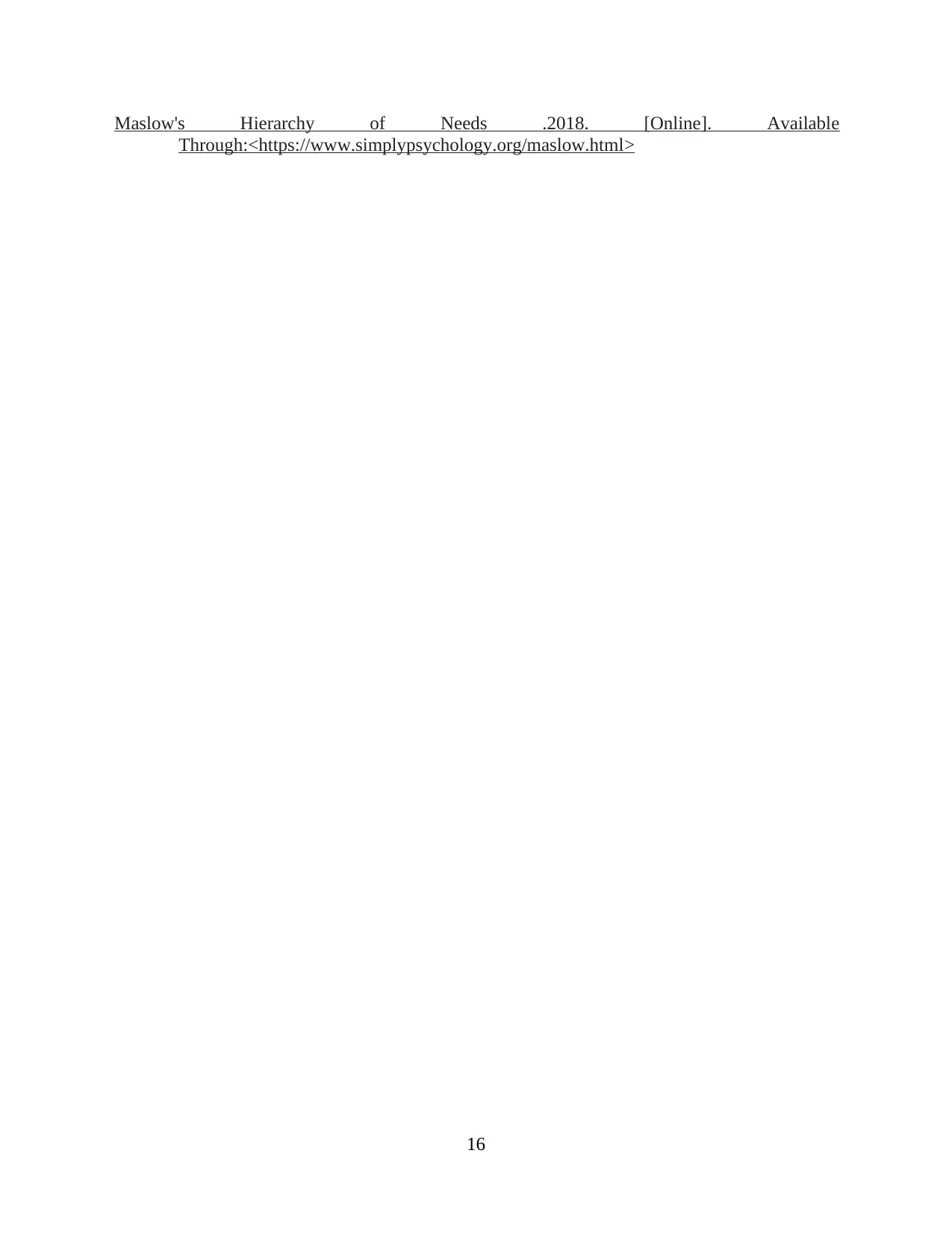
Maslow's Hierarchy of Needs .2018. [Online]. Available
Through:<https://www.simplypsychology.org/maslow.html>
16
Through:<https://www.simplypsychology.org/maslow.html>
16
1 out of 16
![[object Object]](/_next/static/media/star-bottom.7253800d.svg)




